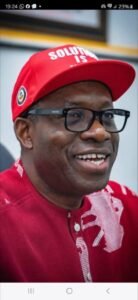
Anambra State Governor, Professor Chukwuma Charles Soludo, CFR, has called for a deliberate ethical and value rebirth in Nigeria, insisting that national development will remain elusive without a fundamental change in the beliefs and behaviors of Nigerians.
Speaking at The Platform in Lagos on Democracy Day, June 12, 2025, Soludo noted that while leadership problems are often highlighted, leaders themselves are products of the larger society and its values. According to him, most Nigerians are complicit in the nation’s challenges, whether by omission or commission.
“We must solve it together—through mass involvement and intentional social re-engineering,” he said.
Soludo advocated for the creation of a critical mass of patriotic Nigerians who believe in the country and are willing to make sacrifices for its progress. He argued that no country has ever achieved sustainable prosperity without active participation by its citizens.
Using examples, Soludo highlighted initiatives such as the NELFUND student loan scheme by the Federal Government, as well as similar programs in Lagos and Kaduna States. He also mentioned Anambra’s “One Youth 2Skills” program aimed at creating thousands of youth millionaires, alongside free education programs and an upcoming student bursary scheme as ways of giving citizens a stake in Nigeria’s future.
However, he warned that such efforts would be undermined if the prevailing culture of corruption and free money is not uprooted. Soludo described a direct link between the “freebies culture” and crimes such as bribery, drug trafficking, oil bunkering, internet scams, kidnapping, and prostitution.
“It is my thesis that a society where no one asks or cares about sources of livelihood is one where transactional governance will always trump transformational leadership,” he stated.
Soludo also criticized the emerging clash of values among Nigerian youths, many of whom now embrace the “get-rich-young-or-die-trying” philosophy, abandoning the principles of hard work, enterprise, and integrity. He noted the role of native doctors, marabouts, and some religious leaders who promise wealth by magical means, misleading millions of youths and contributing to criminal behavior both locally and internationally.
To combat this crisis, Soludo called for a national movement involving all sectors of society, including churches, mosques, markets, civil society organizations, and Nollywood. He emphasized the need for a Citizens’ Code of Conduct, the reintroduction of civics and nationalism in school curricula, and the mainstreaming of ethical reorientation programs similar to the defunct War Against Indiscipline and MAMSER.
Sharing his administration’s response, Soludo highlighted Anambra’s Homeland Security Law, enacted in January 2025. The law criminalizes practices by native doctors or others who promise wealth by magical means and prohibits the use of properties for the manufacture, sale, or consumption of illicit drugs, kidnapping, and related crimes.
He noted that the law empowers authorities to question individuals about their sources of wealth and restricts the indiscriminate awarding of chieftaincy titles to those without verifiable means of livelihood.
According to Soludo, the implementation of this law, combined with the efforts of security agencies, has significantly reduced crime rates in Anambra, making it the safest state in Nigeria.
“Our government is living by example—in austere prudence, transparency, and accountability,” he added. “In three years, we have not borrowed one kobo, devoting 77% of our spending to capital projects, and the results are evident.”
Soludo concluded by emphasizing that ethical rebirth is essential for building a new Nigeria, warning that the normalization of corruption and free money culture must end if meaningful progress is to be achieved.



